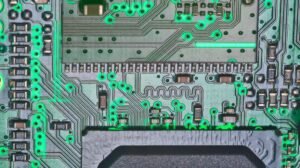Will Artificial Intelligence Surpass Human Intelligence?
With the rapid advancements in technology, the question of whether artificial intelligence (AI) will surpass human intelligence is becoming more and more relevant. AI has made significant progress in recent years, but can it truly match or even surpass the complex cognitive abilities of humans?
Key Takeaways:
- AI has made remarkable advancements, but human intelligence remains unparalleled.
- The debate on the future of AI centers around the development of general artificial intelligence.
- AI can outperform humans in specific tasks, but lacks comprehensive understanding, creativity, and emotional intelligence.
- Current AI systems heavily rely on human-generated data and have limitations in adaptability and common sense reasoning.
Despite AI’s significant progress, it is important to note that human intelligence still holds unique qualities that are yet to be replicated by machines. While AI can excel in specific tasks, its abilities are limited in comparison to the comprehensive understanding and adaptability of the human brain. *However, the development of general artificial intelligence (AGI) poses an interesting possibility.*
In order to surpass human intelligence, AI systems would need to possess a general intelligence that allows them to understand and learn any intellectual task that a human can. Building AGI is an immense challenge, as it requires machines to not only process vast amounts of data but also exhibit creativity, emotional intelligence, and common sense reasoning. *The ability of machines to acquire these human-like traits raises ethical and philosophical questions.*
The Challenges of Achieving General Artificial Intelligence
The development of AGI faces several challenges that hinder its advancement:
- Limited understanding of human intelligence and consciousness.
- Difficulty in transferring knowledge from specific domains to new situations.
- Ensuring ethical use and preventing the potential risks associated with powerful AI systems.
Current Limitations of AI
While AI continues to impress in various domains, its limitations are evident:
- Heavy reliance on human-generated data limits AI’s ability to think beyond the presented information.
- Difficulties in common sense reasoning and grasping contextual nuances that humans effortlessly understand.
- Lack of creativity, intuition, and emotions, which are essential in various professional fields.
Comparing AI and Human Intelligence
| Aspect | AI | Human Intelligence |
|---|---|---|
| Understanding | Limited | Comprehensive |
| Adaptability | Limited | High |
| Emotional Intelligence | None | Present |
Implications and Considerations
As AI continues to evolve, several implications and considerations arise:
- The need for responsible and ethical development and use of AI.
- Addressing potential societal impact, such as job displacement.
- Ensuring accountability and transparency when using AI systems.
The Future of AI and Human Intelligence
While AI has made significant advancements, surpassing human intelligence in its entirety remains a distant possibility. *The symbiotic relationship between AI and human intelligence holds the potential for great advancements in various domains.* Together, they can push the boundaries of human knowledge and improve efficiency, but only if AI is developed and utilized responsibly and ethically.

Common Misconceptions
Misconception 1: Artificial Intelligence is already more intelligent than humans
Many people believe that artificial intelligence has already surpassed human intelligence. However, this is not true as AI systems lack the ability to possess true consciousness or the same level of general intelligence as humans.
- AI is designed to perform specific tasks and lacks the ability to engage in a wide range of intellectual and creative activities like humans
- AI systems heavily rely on algorithms and large amounts of data to make decisions, whereas humans possess intuition and can exercise judgment based on experience and reasoning
- Human intelligence encompasses emotional intelligence, social skills, and the capability to understand complex moral and ethical dimensions, which AI does not possess
Misconception 2: Artificial Intelligence will replace human jobs entirely
There is a popular belief that AI will replace all human jobs, making humans obsolete in the workforce. However, this is a misconception as AI is designed to augment human capabilities, not replace them completely.
- While AI may automate certain tasks, it often requires human oversight and intervention, especially in critical and complex decision-making processes
- AI systems work best when they complement human skills, such as data analysis and decision support, allowing humans to focus on more creative and strategic aspects of their work
- New job opportunities will arise due to the adoption of AI technology, as humans will be needed to develop, maintain, and manage AI systems
Misconception 3: Artificial Intelligence will become self-aware and take over the world
In popular culture, AI is often portrayed as becoming self-aware and developing an intent to take over humanity. However, this is purely fictional and does not align with the current state of AI technology.
- AI systems lack consciousness and do not possess desires or intentions like human beings
- The development of AI is based on specific goals and functions determined by human programmers, making it unlikely for AI to suddenly gain a will of its own
- AI systems are designed to operate within predefined boundaries and cannot autonomously alter or exceed their intended purposes without human intervention
Misconception 4: Artificial Intelligence will solve all of humanity’s problems
While AI has the potential to offer significant benefits, it is important to recognize that it is not a magic solution capable of solving all of humanity’s problems.
- AI systems have limitations and can be biased, making them prone to perpetuating existing societal inequalities and discrimination
- AI should be seen as a tool that requires human guidance and ethical considerations to ensure it is used responsibly and for the betterment of society
- There are complex social, economic, and political issues that AI alone cannot resolve and require a holistic approach involving human intelligence and collaboration
Misconception 5: Artificial Intelligence will lead to human extinction
Contrary to popular belief, the development of AI does not pose a threat of human extinction or complete annihilation.
- AI is a human-created technology, and its progression and application are ultimately determined by human decision-making
- Concerns regarding the existential risk of AI are mainly focused on scenarios where AI development lacks proper oversight and control mechanisms
- Ethical frameworks and regulations can be implemented to guide AI development and ensure its alignment with human values and safety

AI vs. Human Intelligence: A Comparison of Capabilities
As advancements in artificial intelligence (AI) continue to unfold, we are left wondering if AI will eventually surpass human intelligence. To delve deeper into this subject, let’s examine various aspects of AI and human abilities and the remarkable progress made in AI technology.
Development Timeline: AI vs. Human Intellect
Charting the development timeline of AI and human intellect provides a fascinating understanding of how the two compare:
| AI Development | Human Intellect |
|---|---|
| 1950s: Early AI research and symbolic AI | 50,000 BCE: Emergence of human intelligence |
| 1980s: Expert systems and neural networks | 3,000 BCE: Birth of written language |
| 1990s: Machine learning and data-driven AI | 1450 CE: Printing press revolutionizes knowledge sharing |
| 2010s: Deep learning and natural language processing | 1940s CE: First electronic computers developed |
| 2020s+: AI surpasses human capabilities? | Ongoing: Human intellect continues to evolve |
Learning Capacities: AI vs. Human Brain
When it comes to learning capacities, it’s fascinating to observe the differences between AI and the human brain:
| AI | Human Brain |
|---|---|
| Processes immense volumes of data rapidly | Extracts patterns and insights from limited data |
| Can specialize in a narrow field with great depth | Displays adaptability across various domains |
| Reinforcement learning enables self-improvement | Emotions and experiences shape personal growth |
| Requires manual fine-tuning and retraining | Adapts and self-corrects through diverse experiences |
Memory and Storage Capacity: AI vs. Human
Exploring the limitations and capabilities of memory and storage in AI and humans provides intriguing insights:
| AI | Human |
|---|---|
| Boasts vast storage capacity and quick access | Cognitive limitations in memory capacity and retrieval |
| Requires explicit instructions for accessing information | Associative memory facilitates intuitive recollection |
| Capable of virtually unlimited data retrieval | Mental fatigue and information overload impact performance |
| Can process and analyze vast datasets simultaneously | Relies on selective focus to process information |
Emotional Intelligence: AI vs. Human
Exploring the realm of emotions uncovers the contrasting aspects between AI and human emotional intelligence:
| AI | Human |
|---|---|
| Lacks subjective experiences and emotions | Displays complex emotions and interpersonal connections |
| Recognizes emotions through facial recognition and voice analysis | Picks up on subtle cues and displays empathetic responses |
| Emotionally unbiased decision-making based on programming | Personal experiences and values influence decision-making |
| May mimic emotional responses without genuine understanding | Differentiates and experiences the depth of emotions firsthand |
Creativity and Originality: AI vs. Human
Comparing the realms of creativity and originality between AI and humans reveals unique characteristics:
| AI | Human |
|---|---|
| Generates novel ideas based on trained models | Employs imagination and intuition in idea generation |
| Derives creativity from patterns and existing information | Capable of unconventional, out-of-the-box thinking |
| Relies on algorithms for problem-solving and innovation | Engages in brainstorming and iterative processes |
| Produces creative content with human-like qualities | Displays authenticity and unique personal expression |
Ethical Considerations: AI vs. Human Decision-Making
Delving into the ethical aspects of decision-making by AI and humans, we find intriguing distinctions:
| AI | Human |
|---|---|
| Unbiased decisions based on predetermined algorithms | Subject to bias and influenced by personal beliefs |
| Cannot possess moral values or intuitive judgments | Engages in moral reasoning and assesses consequences |
| Requires explicit ethical guidelines for decision-making | Internalizes moral principles and empathetic considerations |
| Risks amplifying existing societal inequalities | Capable of fostering fairness and social justice |
Physical Abilities: AI vs. Human
Examining the physical capabilities of AI and humans reveals the disparities and potential applications:
| AI | Human |
|---|---|
| Can perform repetitive tasks with precision and endurance | Demonstrates complex motor skills and agility |
| Unfaltering attention and no physical fatigue | Subject to fatigue and requires rest for optimal performance |
| Capable of superhuman strength and speed | Demonstrates adaptability and ingenuity in physical activities |
| Exhibits limited mobility and lack of physical presence | Navigates the external world with intricate coordination |
Collaboration: AI and Human Synergy
When considering the potential synergy between AI and human intelligence, collaboration emerges as a crucial domain:
| AI | Human |
|---|---|
| Augments human abilities and accelerates innovation | Guides AI through human feedback, values, and oversight |
| Provides insights and analysis for informed decision-making | Offers creativity, emotional depth, and contextual understanding |
| Assists in automating complex tasks for improved productivity | Utilizes AI as a tool to enhance individual capabilities |
| Enables human-AI collaboration for societal problem-solving | Engages AI while retaining responsibility for ethical judgments |
As AI advances steadily across numerous domains, surpassing human intelligence remains an intricate question. While AI demonstrates exceptional capacities in certain areas, the nuanced complexities and broad spectrum of human intelligence continue to astound. Rather than perceiving it as an either-or scenario, envisioning a future where humans and AI cooperate in symbiotic harmony presents incredible possibilities for societal progress and human well-being.
Frequently Asked Questions
Will Artificial Intelligence surpass human intelligence?
What is Artificial Intelligence (AI)?
Artificial Intelligence (AI) refers to the development of intelligent machines that can perform tasks that typically require human intelligence. These tasks may include learning, problem-solving, speech recognition, and decision-making.
Can AI ever surpass human intelligence?
Is there a possibility that AI will surpass human intelligence?
There is ongoing debate among experts about whether AI can surpass human intelligence. While AI has made significant advancements in various fields, achieving true human-like intelligence remains a challenging task.
What are the limitations of AI compared to human intelligence?
In what aspects is AI currently limited compared to human intelligence?
AI currently lacks the broad general knowledge, creativity, intuition, and common sense that humans possess. Human intelligence also involves emotional intelligence, empathy, and the ability to understand and navigate complex social interactions.
What are some arguments for AI surpassing human intelligence?
What reasons do proponents provide for the possibility of AI surpassing human intelligence?
Some arguments for AI surpassing human intelligence include the exponential growth of computational power and the potential for AI algorithms to continuously learn and improve. Proponents also argue that AI has the potential to enhance its own capabilities, leading to rapid advancements.
What are some arguments against AI surpassing human intelligence?
What reasons do skeptics provide against the possibility of AI surpassing human intelligence?
Skeptics argue that human intelligence is not solely based on logical reasoning and problem-solving skills, but also involves consciousness, subjective experiences, and moral reasoning. They believe that replicating these aspects of human intelligence is extremely challenging, if not impossible, for AI systems.
How does AI impact various industries and jobs?
What effects does AI have on industries and employment?
AI has the potential to greatly impact various industries by automating tasks, improving efficiency, and enabling new capabilities. While it may eliminate certain jobs, it can also create new job opportunities in AI development and management.
Is there a timeline for AI surpassing human intelligence?
Can we predict when AI will surpass human intelligence?
Predicting the exact timeline for AI surpassing human intelligence is highly uncertain. Some experts believe it could happen within the next few decades, while others consider it a possibility in the distant future.
What are the ethical implications of AI surpassing human intelligence?
What ethical issues arise from the potential of AI surpassing human intelligence?
Ethical concerns include the responsibility and control over powerful AI systems, potential biases embedded in AI algorithms, the impact on privacy and security, and considerations regarding the role of AI in decision-making that affects human lives.
Are there any benefits to AI surpassing human intelligence?
What positive outcomes might arise from AI surpassing human intelligence?
If AI surpasses human intelligence in a beneficial and controlled manner, it has the potential to solve complex problems, increase productivity, improve healthcare, and even assist in finding solutions to global challenges such as climate change.
How can society prepare for the potential of AI surpassing human intelligence?
What steps can society take to prepare for the implications of AI surpassing human intelligence?
Preparation may include the development of robust ethical frameworks, regulations, and policies surrounding AI, investing in AI education and research, fostering collaboration between AI developers and various stakeholders, and actively engaging in discussions about the future of AI and its impact on society.




